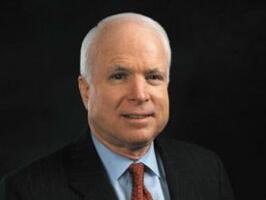Rasmussen Markets Update: Potomac Primary Has Little Impact
Barack Obama and John McCain rolled up big victories in the “Potomac Primary” yesterday, but it had little impact on their prospects for the nomination.

Barack Obama and John McCain rolled up big victories in the “Potomac Primary” yesterday, but it had little impact on their prospects for the nomination.

A century ago, actually about 26 years ago, the powers in the Democratic Party decided it was time to take back control of the nominating process from the often derided crazies who had been leading the Party straight down the tubes with their choices of McGovern and Carter. Of course, Carter did win, but that was in 1976.

Just 15% of American voters say that Congress is doing a good or an excellent job. A recent Rasmussen Reports national telephone survey found that 46% now give Congress a poor rating. Bleak as those figures are, they reflect a modest improvement from a month ago when just 13% were willing to give the legislators good or excellent marks for their efforts.

NEW YORK, NY, Feb 12, 2008 (MARKET WIRE via COMTEX) -- Nearly a third (29 percent) of US workers now consider work-life balance and flexibility to be the most important factor in considering job offers, according to a new Hudson survey.

The Hudson Employment Index(SM) held steady in January as worker confidence decreased by only three-tenths of a point to 89.0.

Attendance has been falling at America's National Parks since 1987. Blame videophilia, says a Nature Conservancy report.

A Rasmussen Reports national telephone survey found that 60% of Americans would like to see U.S. troops brought home from Iraq within a year.

Expectations are high this Tuesday morning for Senators Barack Obama and John McCain as they compete for delegates along the Potomac River. For Obama, Tuesday’s Primaries offer a chance to continue a winning streak that included wins over the weekend in Washington, Nebraska, Louisiana, the Virgin Islands, and Maine.

I believe that Barack Obama will defeat Hillary and win the Democratic nomination. I think that this weekend's victories in states as diverse as Washington State, Louisiana, Nebraska, and Maine illustrates his national appeal and demonstrates Hillary's inability to win in states without large immigrant and Latino populations.

As Barack Obama and Hillary Clinton settle in for a long contest that may not end until the Democratic convention, many conversations naturally drift to the question of which candidate would fare better against likely Republican nominee John McCain.

John McCain heads into Super Tuesday with 93 delegates from earlier victories and is likely to pick up far more delegates than any of his challengers on that momentous day.

As Barack Obama and Hillary Clinton settle in for a long contest that may not end until the Democratic convention, many conversations naturally drift to the question of which candidate would fare better against likely Republican nominee John McCain.

Last week, Rasmussen Reports noted that something might have changed in the Democratic race following Obama’s huge victory in South Carolina and high profile endorsements from the Kennedy clan.

With the passing of the holiday shopping season, consumers are expecting to scale back their spending in January, as ratings of the economy and their personal finances worsened.

Expectations that Barack Obama will be the Democratic Presidential nominee soared following the Senator’s weekend string of victories in Louisiana, Nebraska, Washington, and Maine. As of Monday morning, Rasmussen Markets data gave Obama a 70% chance of representing the Democratic Party in November’s election.

Given four choices as to the size of the federal budget presented by the President last week, 39% of American voters did not offer any answer, 36% guessed wrong, and just 24% knew the answer--$3.1 trillion dollars.

WASHINGTON, D.C. -- Which Democrat really won Super Tuesday? Thanks to the Democratic Party's proportional representation, it is not easy to say a week later. Sen. Hillary Clinton and Sen. Barack Obama ran a virtual dead heat for delegates that day in 22 states clearly stacked in Obama's favor. But the way Obama lost California raises the specter of the dreaded Bradley Effect.

The latest Rasmussen Reports tracking poll finds that 49% of Americans now say the U.S. and its allies are winning the War on Terror (see crosstabs). That’s up from 43% a month ago and is the highest level of confidence measured in more than three years.

A Rasmussen Reports national telephone survey found that voters are not likely to be impressed by high profile political endorsements.

Well, Super Tuesday is over, and now we have two major party presidential nominees. That's the lead sentence I thought five weeks ago I'd be writing for this column. But the 33-day round of caucuses and primaries that seemed likely to produce decisions after 23 states voted on Super Tuesday have failed to deliver.